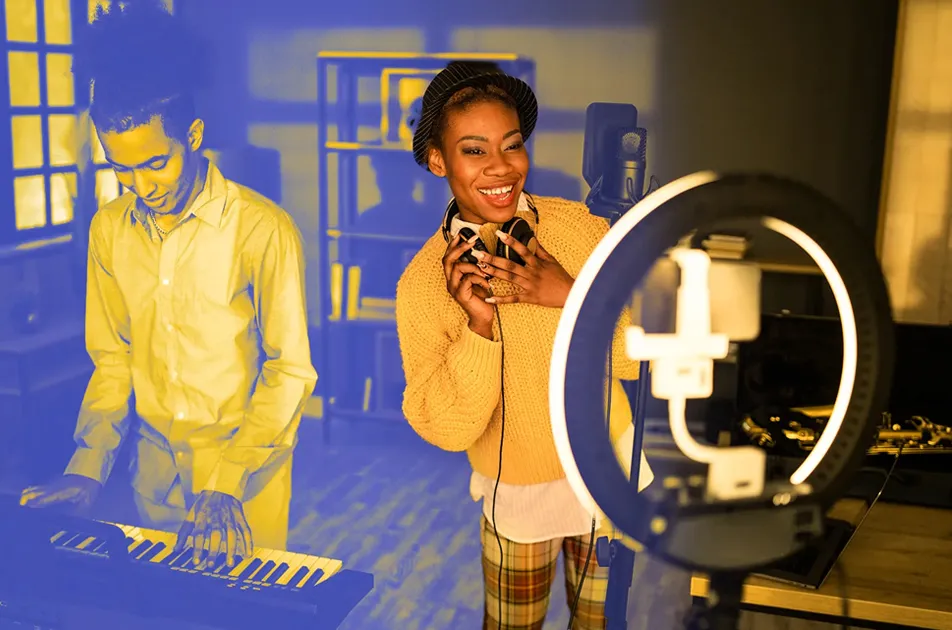As a songwriter, you’ll eventually hit a wall where the lyrics you’re writing just aren’t as fresh and interesting as they once were. Creative roadblocks like this are inevitable, but can also be overcome relatively easily. Here, we look at six devices that will help you reignite the creative spark.
Guest post by Dan Reifsnyder of Soundfly’s Flypaper
It’s bound to happen. At some point, you’re going to find your lyrics getting stale. Maybe you don’t even notice it yourself; a friend or colleague has to tell you. Worse, maybe you’re in that all-important pitch session and the publisher says your lyrics aren’t fresh enough.
So how to get out of your rut and make your lyrics shine with originality again? Here are a few devices to do just that!
1. Change the Perspective
It’s always important to consider who is singing, and who they’re singing to — that’s Songwriting 101. But if you find yourself struggling for fresh ideas, it might be a good idea to delve into different perspectives.
Is it a male singing to his best friend? A female singing to hers? Someone in love, singing to their beau? Can you take steps to blur those lines so it’s not so clear? Suddenly your lyrics might take on a whole new meaning, or force you to write new lines that fit with the new perspective.
You might discover your song is so much more unique with just that little tweak in perspective; and that your straight-down-the-middle solo perspective gains new life as a story song, a duet, or even something completely different.
2. Find Another Word
As a songwriter, there are certain words that make me sigh to myself and put my head in my hands. Not because the words are bad or boring in and of themselves, but because they’re so overused that it’s difficult to tread new ground.
Take for example the word “love.” (You knew this was coming.)
Probably more ink — and tears — have been spilled over this word than any other since the dawn of time. It’s very, very difficult to come up with a new perspective that also rings true with relatability. So find another way to say it. How does love make you feel? What does it do to you?
As an example, rather than saying “I love you” in your lyrics, what about “you set my heart on fire?” That’s still not exactly a home run lyrically, but you’ve avoided using a very tired old word that might turn listeners off, and maybe injected some new life into your lines. It’s a great starting point.
+ Read more on Flypaper: “Here’s Just a Bunch of… Songwriting Prompts (Go Nuts!)”
3. Write from the Perspective of an Inanimate Object
One of the coolest tricks in a songwriter’s playbook is writing from the perspective of an inanimate object. I’ve heard incredible songs from the perspective of roads (dirt and highway), trees, chairs, and even more.
This forces the writer into a new way of thinking. And saying what you want to say while staying within the limitations of that object’s frame of reference can be oddly freeing.
Can a road “hold you in its arms?” No, but it’s got shoulders. Can a chair talk? No, but it can support someone.
Even if the song itself doesn’t turn out as intended, this exercise can broaden your perspective and enhance your creativity.
+ Learn songwriting, theory, production, composition, arranging, mixing, and more — whenever you want and wherever you are. Subscribe for unlimited access!

4. Immerse Yourself in Fresh Culture
There is a tendency by artists to get rather curmudgeonly about new art; we like “our” music, whether that’s ’80s synth, ’90s grunge, or pop from the early 2000s. Naturally, that tends to be what we gravitate towards when we listen to music, and it ends up coming out when we write too.
Without realizing it, our music can sometimes become “dated” before it has even had a chance to be contemporary. This can happen both lyrically and musically.
Go back and read some lyrics from the 1930s and ’40s. Most of it is pretty obviously out of step with current culture. With a few timeless exceptions, the words just don’t sound natural or conversational, it just isn’t how people talk today. The same exact thing is happening to your music right now — albeit much more slowly.
So tune yourself in to what’s popular now. Listen to what artists are talking about and how they’re talking about it. I’m not suggesting you cop their style by any means, but be aware of what phrases today’s artists are using and whether they tend to stick, or fade away. Try to notice where you might be using dated phrases and substitute fresh ones!
5. Ruthlessly Root Out Clichés
Despite many people rolling their eyes at them, many clichés are clichés for a reason — they resonate universally and perfectly describe or express something we’re feeling. But like a song that’s beaten to death on the radio, somewhere along the line, every turn of phrase gets old.
Whenever I hear a well-worn cliché in a song, I feel like the writer was just being lazy. It’s kind of like grabbing the lowest, easiest fruit on the tree. But if you climb a little higher — and sometimes you have to climb a lot higher — you’ll find that unique way to spin a word or phrase on its head to make your lyric pop.
This may sound strange, but try to think of it like making the predictable unpredictable. It’s difficult to do, I know, but that’s part of your job as a writer. Lead the listener in one direction and then flip the language like a coin. If you can’t come up with some other way to say something, at the very least avoid well-trod cliche´s like the plague.
6. Avoid Dated References
This is similar to the above point, but it’s slightly different. While certain things, people, and events are timeless and universally known, some others tend to fade in and out of pop culture (sometimes very quickly).
Is that champion boxer you mention in your lyrics going to go over the head of today’s teen music listener? Or how about listeners ten years from now? Is the movie or song you mentioned a generation-spanning classic, well-loved even today by many generations? And what about that reference to an essential technology? (We all know those are doomed.)
For instance, we do not use pay phones anymore. We don’t memorize phone numbers, or have CD collections, or take taxi cabs (we use Uber and Lyft, thank you very much). Email is even slightly dated nowadays, when people can just text each other.
You might just be shocked to find that many of today’s teenagers have no idea who the Red Hot Chilli Peppers are, or has never even heard of Ghostbusters. The absolute safest way to go is avoid pop culture references altogether. But sometimes your hook is so good, or the point you want to make really needs that extra kick, and you want to throw the reference in, and that’s fine. Just make it tasteful.
Don’t be afraid to do that if you need to, just know that it probably has a shelf life. A few years (or decades) down the line you might need to revisit those lyrics and update the reference.
There are just a few ideas to get you started on the road to fresher lyrics. And I am by no means trying to offer one-size-fits-all suggestions. There’s every chance in the world that my advice could be perfectly applicable to one writer, and not work at all for your song.
Always listen to your inner voice, evaluate all the criticism and insight you’ve gotten from friends and cowriters, and forge forward. You may even discover tricks of your own that work even better than these do.
Daniel Reifsnyder is a Nashville-based, Grammy-nominated songwriter, having started his musical journey at the age of 3. In addition to being an accomplished commercial actor, his voice can be heard on “The Magic School Bus” theme song and in Home Alone 2. Throughout his career, he has had the honor of working with the likes of Michael Jackson and Little Richard among many others. He is a regular contributor to several music related blogs, including his own, Songsmithing.net.





